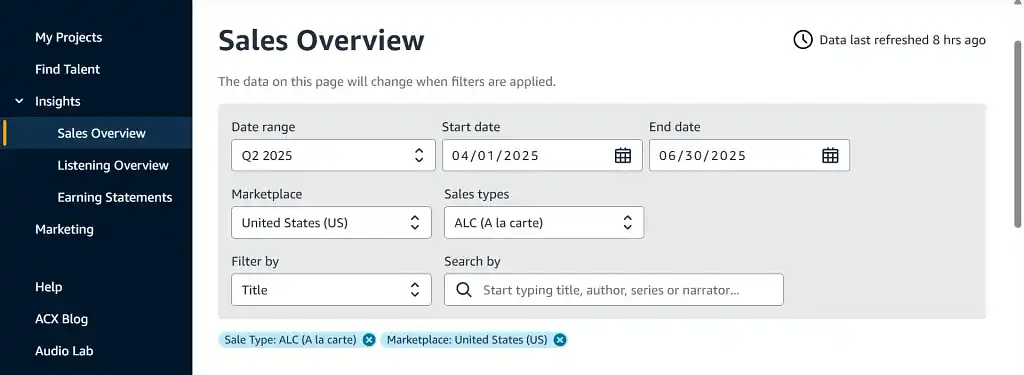Blog • Understanding Publishing
Posted on Aug 22, 2025
ACX Review: Read This First
Loretta Bushell
Loretta is a writer at Reedsy who covers all things craft and publishing. A German-to-English translator, she specializes in content about literary translation and making a living as a freelancer.
View profile →Linnea Gradin
The editor-in-chief of the Reedsy Freelancer blog, Linnea is a writer and marketer with a degree from the University of Cambridge. Her focus is to provide aspiring editors and book designers with the resources to further their careers.
View profile →The Audio Publishers Association found that 51% of Americans aged 18 and older have listened to an audiobook — that’s 134 million people in the US alone. The most obvious way for self-publishing authors to tap into this market is through ACX — the audiobook equivalent of KDP. But is this really the best option?
Owned by Amazon, Audiobook Creation Exchange (ACX) allows authors and publishers to hire a narrator or upload an existing MP3 file, then release their audiobook to Amazon, Audible, and Apple Books all in one go.
While it’s easy to reach a large number of listeners via ACX, the platform comes with several caveats, including opaque royalty structures and strict eligibility criteria.
In this article, we’ll tell you everything you need to know about ACX to help you decide whether to use its services. But first, here’s a quick overview.
📆 Launched: 2011
📍 Available in: United States, Canada, United Kingdom, and Ireland
🌎 Reach: Most countries across the globe
💰 Cost: Free to distribute; on-platform production costs vary
💸 Royalties: 40% exclusive rate and 25% non-exclusive rate; option to split royalties with producer in exchange for reduced upfront production costs
📇 Distribution channels: Amazon, Audible, and Apple Books
🌟 Alliance of Independent Authors’ service rating: Caution
👑 Best for: Eligible authors whose #1 priority is to reach the highest percentage of the market
|
✅ Pros |
❌ Cons |
|
One platform for creation and distribution |
Restricted to authors resident in the US, Canada, the UK, and Ireland |
|
Longer max chapter length than competitors |
Restricted to titles that already exist on Amazon in print or ebook format |
|
Flexible payment options for production |
No control over pricing |
|
Large global reach |
No library distribution |
|
Monthly royalty payments |
The best royalty rates are only available if you stay exclusive to ACX |
|
Free promo codes for marketing (but only if you stay exclusive to ACX) |
Controversial royalty payment terms and a $10 minimum royalty payment |
|
Some reporting and analytics |
Poor customer support |
Read on for an in-depth analysis of ACX for authors.
Eligibility criteria (1/5)
ACX is only available to authors who:
- Are a resident of, have a tax identification number from, and own a bank account in the US, Canada, the UK, or Ireland; and
- Have already published their title as an ebook on Amazon.
If you want to publish only an audiobook or if you live in any of the other 190+ countries of the world, you’ll have to turn to another platform to create and publish your audiobook.
Production (3/5)

If you are lucky enough to meet the eligibility criteria, ACX is a convenient one-stop platform to turn your written book into an audiobook. The user-friendly dashboard guides you through the process of “auditioning” and hiring a producer, who is responsible for both narrating and editing your audiobook to a publishable standard. Think of them as a voice actor and sound engineer all in one.

Payment plans
There are three different ways you can pay your producer:
- Pay everything yourself upfront;
- Pay nothing upfront but split royalties 50/50 with the producer; or
- Pay a reduced fee upfront with a 50/50 royalty split.
Take a look at the table below to see which one we recommend for you.
|
💰 Payment plan |
❓Description |
✅ Pros |
❌ Cons |
👑 Best for |
|
Pay for Production |
You pay the producer per finished hour. You don’t share any royalties with them. |
Fixed price that doesn’t increase with sales |
Significant upfront investment; may be more expensive if you don’t meet sales targets |
Authors with the ability to pay upfront who expect to make a significant number of sales OR authors who don’t want to publish exclusively via ACX |
|
Royalty Share |
You pay the producer nothing upfront. You split your royalties with them 50/50 for a minimum term of 7 years. |
No out-of-pocket expenses |
Only available to authors who publish their audiobook exclusively via ACX; unlikely to get interest from top producers (unless you are a known bestselling author); more expensive if you end up dramatically exceeding sales targets |
Authors on a tight budget who don’t mind working with less experienced (and possibly lower-quality) producers |
|
Royalty Share Plus |
You pay a reduced per-finished-hour fee upfront and split your royalties 50/50 with your producer for 7 years. |
Good balance between saving money and compensating producers fairly |
Only available to authors who publish their audiobook exclusively via ACX; higher cost than Royalty Share |
Most authors who are willing to publish exclusively via ACX |
Uploading process (4/5)
If you have the skills or contacts to produce your audiobook independently of ACX, the platform caters to you, too. The uploading process is fairly straightforward. Just bear in mind that each chapter must be no longer than 120 minutes in length — which is fairly standard and in fact more flexible than other platforms, such as Author’s Republic (which has a 78-minute limit).
Read other audio submission requirements here.

FREE COURSE
Audiobook 101
Learn to create a professional audiobook and stand out in a growing market.
Distribution (3/5)
When it comes to distribution, you theoretically have two choices: pay more to go wide, or pay slightly less but remain exclusive to ACX. However, whether you actually get to choose depends on your payment plan.
Exclusive distribution
If you go with either of the royalty share plans, you have to remain exclusive to ACX — meaning your audiobook will only be available to listeners on Amazon, Audible, and Apple Books. Fortunately, this is quite a lot of listeners: Audible holds by far the largest market share in the US (63.4% as of 2022).
If you pay upfront for production or upload your own audio files, you still have the option to go exclusive, or you can opt for a lower royalty rate in exchange for permission to publish your audiobook on other platforms.
Wide distribution
Why might authors sacrifice a higher royalty rate for wider distribution? For two good reasons. Firstly, not all target demographics listen to audiobooks in the same place. For example, many younger listeners (aged 18–34) listen to audiobooks on Spotify. If you go with the more attractive ACX exclusive rate, you risk missing out on this audience. So it’s always worth investigating where your ideal consumers can be found before choosing your distribution channel(s).
Secondly, going wide enables you to get your audiobook into libraries. This is a good way to reach listeners who aren’t willing or able to pay for audiobooks themselves, while still getting paid for your work. Some countries, such as the UK, Ireland, and Canada, have schemes that compensate authors for each library loan, in addition to the royalty the library pays when they purchase your title.
Whichever you choose, both ACX’s exclusive and non-exclusive distribution options share one disadvantage: you can’t control the price of your audiobook. While Amazon will surely set the price to whatever it thinks is most profitable, not all authors are motivated by profit and not all audiobooks follow general demand trends. If you’d prefer to set your own price according to your unique priorities and knowledge of your audience, ACX is not the platform for you.
Royalties (2/5)
Royalties are where ACX really fails. There has been a lot of controversy over the company’s payment terms in the last five years, leading the Alliance of Independent Authors to downgrade ACX’s service rating to “Caution.” We’ll dive into the latest controversies shortly, but first let’s take a look at the platform’s basic royalty structure.
|
📇 Distribution plan |
💸 Royalties |
|
Exclusive |
40% (20% if on a royalty share plan) |
|
Non-exclusive |
25% |
These rates are not the highest (for instance, Kobo Writing Life offers 32–45% royalties), but they are better than the total royalties you’ll get from many platforms if you go through an aggregator, a company that distributes to many retailers at once in exchange for a cut of your revenue.
Controversial returns policy
The first big complaint authors have about ACX’s royalty terms is that listeners can buy a title, listen to it in full, and then return it (within 7 days) for a full credit refund. When this happens, authors get no compensation.
Since some users understandably make the most of this system to listen to more audiobooks at no extra cost, the policy has a hugely negative impact on authors. And yet, despite years of backlash, ACX has failed to adequately resolve the issue.
A new but not improved royalty model
As of 2025, ACX is in the process of rolling out a new royalty model for Audible, which is also causing significant upset within the author community.
On the surface, the new royalties, accessible only to select creators, sound impressive: 50% for exclusive authors and 30% for non-exclusive. However, these percentages don’t apply to the list price, but to the title’s share of something called the “Member Value.” This means the author’s earnings are unpredictable and often lower than they would have been under the old model.
To understand this (admittedly confusing) system, we need to look at Audible’s subscription plans for listeners.
|
🎟️ Subscription plan |
✨ Features |
|
Plus |
Listen to unlimited audiobooks from the Plus Catalogue (mostly well-known titles) |
|
Premium Plus |
Listen to unlimited audiobooks from the Plus Catalogue and get monthly or yearly credits to buy audiobooks from outside this collection (which you can keep forever) |
You might assume that when a Premium Plus listener spends their credit on an audiobook from outside the Plus Catalogue, that author receives 50% (or 30%) of the value of the purchase. Unfortunately, this is not the case.
Instead, Audible calculates a listener’s Member Value from their plan value (Plus or Premium Plus) and the value of any additional credits used that month (though ACX hasn’t revealed how they come up with the exact numbers for each). Then, it divides the Member Value among all the titles the subscriber has listened to that month, including those from the Plus Catalogue, based on their relative à la carte list prices. It’s 50% (or 30%) of that figure that the author gets to take home.
So, for example, if a Premium Plus member listens to two titles from the Plus Catalogue, both of which have a list price of $25, and uses their credit to buy one other title priced at $30, the author of the purchased title will receive:
30/(25+25+30) x Member Value x Royalty Rate
Based on a hypothetical Member Value of $15 and the exclusive royalty rate of 50%, the author will receive $2.81 — much, much less than 50% (or even 40%) of $30. If the Audible member listens to more than three books in a month, this value will decrease even further.
Meanwhile, the authors of the Plus titles will each receive $2.34 (based on a 50% royalty rate). Thus, the money the listener thinks they are giving to just one author is actually being shared between multiple authors — and not many people know this because Audible's not advertising it plainly!
For a more detailed explanation of the new royalty model, watch Daniel Greene’s YouTube video. Along with Robin Sullivan and Brandon Sanderson, Greene is trying to show the world that ACX’s latest move is bad for all authors except those with big names enrolled in the Plus Catalogue.
Meanwhile, ACX is trying to convince authors that their new system works. They claim that its earliest adopters have seen a 45% rise in earnings on average, thanks to increased exposure from the all-you-can-listen catalog. We can't help but notice that the case studies all feature authors who have already made something of a name for themselves, though.
Timely payments
On a more positive note, royalties are paid out monthly, so you can be sure that the money will be in your account when you expect it — provided you have earned at least $10 that month. If you consistently earn less than $10 each month, you will get paid once you have accumulated a total of $50.
Promotion (3/5)

When it comes to reaching listeners, ACX has a few tools to help you:
- Author profile pages: Add a headshot and links to your social media accounts to connect authentically with listeners. Good for building your author platform and creating an engaged long-term fan base.
- Free promo codes (exclusive authors only): Use your 50 free promo codes (25 for the US, 25 for the UK) to generate listens and drive reviews — which will help your audiobook perform better against Amazon’s algorithms. Get an additional 25 promo codes per marketplace once you have had 10 codes redeemed and made 100 qualified sales.
These tools are useful, but far from essential, and in fact aren’t enough to promote your audiobook effectively on their own. That said, no distribution platform will offer everything you need to market your title; it’s up to you to build a mailing list and get your name out there.

FREE COURSE
How to Build Your Author Mailing List
Learn how to connect with your audience and sell more books with email.
You can also view some data on your daily listens, which you can filter by date or marketplace, to gain some insight into where and when to focus your marketing efforts. However, ACX’s analytics fall well short of other platforms, such as Spotify for Authors, which give more insight into listeners’ demographics and preferred podcast categories.

Customer service (1/5)
In typical Amazon style, ACX’s customer service has a poor reputation. Authors on TrustPilot report struggling to reach the support team and experiencing slow response times when they finally get through.
Some examples of unresolved issues authors have faced include not being able to change their email address, being ignored when reporting another user’s policy violations, and having their account terminated if they don’t respond to a request for information within as little as 24 hours.
Verdict: Should you publish your audiobook on ACX?
With its misleading royalty rates and poor customer service, ACX is by no means an ideal company — but you won’t find a better way to get your title onto Audible, the #1 audiobook listening platform. So, if a large global reach is important to you (and you meet the eligibility criteria, of course), it may still be worth publishing your audiobook on ACX — especially if you join the exclusivity program.
On the other hand, if you can reach your audience via other platforms, you’ll likely have a better overall experience using an alternative distributor, such as Kobo Writing Life, Voices by INaudio, or Author’s Republic. And if you’re not resident in the US, Canada, the UK, or Ireland, know that you’re not missing out on a wonderful service!
Reedsy Rating: 2.5/5







